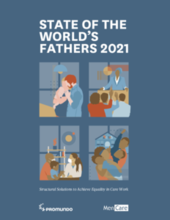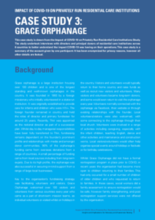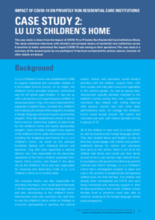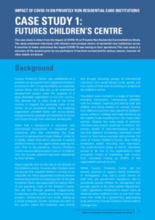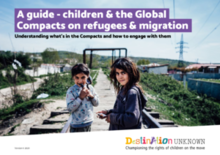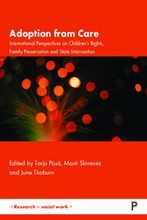Displaying 1131 - 1140 of 4424
The State of the World’s Fathers 2021 report – the fourth in the series – presents research on care work during the COVID-19 pandemic, focusing on structural barriers that prevent equitable distribution of caregiving between women and men.
This series of 3 training sessions is based on the newly developed handbook on “Civil Registration, Vital Statistics, Identity Management: Communication for Development targeting CRVS practitioners in LMICs,” which provides guidance on the use of different tools to research, design, implement strategies and measure Social and Behavior Change/ Communication for Development.
In this series of critical conversations, experts share their insights about racism, colonialism, patriarchy and power as they affect children and families around the world.
This case study is drawn from the Impact of COVID-19 on Privately Run Residential Care Institutions Study. It presents a summary of the account given by one participant.
This case study is drawn from the Impact of COVID-19 on Privately Run Residential Care Institutions Study. It presents a summary of the account given by one participant.
This case study is drawn from the Impact of COVID-19 on Privately Run Residential Care Institutions Study. It presents a summary of the account given by one participant.
This tool is an adaptation of the BCN Country Care Profile Matrix which can be used by practitioners, organisations or networks seeking to develop a better understanding of the status and functioning of the care system in their country of operation.
This guide analyses the Global Compact for Safe, Orderly and Regular Migration (GCM) and the Global Compact on Refugees (GCR) through a child rights lens and outlines the measures foreseen in these documents (the Global Compacts) for the protection of the rights of the child.
This book introduces general topics on human rights and attachment, as well as a country-specific in-depth analysis of the legal and policy imperatives guiding adoptions from care, with a particular interest on the rights of children and their care-taking adults, including their birth parents
The Reconstructing Children’s Rights Institute is an online institute about dismantling racism, neo-colonialism, and patriarchy in humanitarian and development efforts to protect children and support families.

